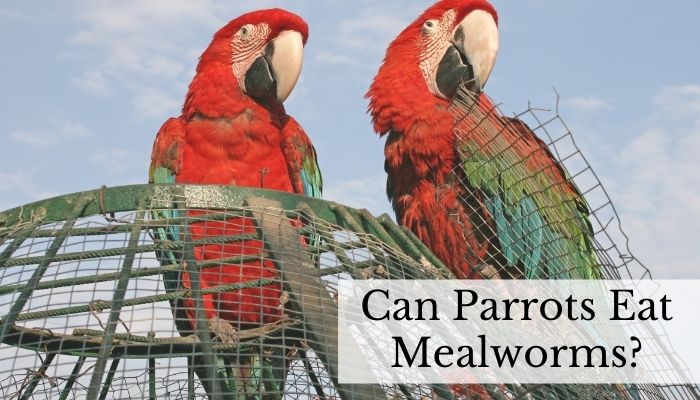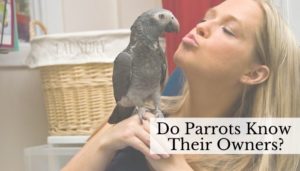Thanks to their colorful plumage, tendency to mimic human words, and great personality, parrots make for an exciting bird companion and are one of the most popular pets to have in the whole world. That personality is one of the main reasons it’s super easy for an owner to endear themselves to these beautiful birds.
But part of taking care of a parrot means feeding them a proper diet, which, unfortunately, not many people know. Luckily, feeding them is easy, and anything not found in your kitchen is most likely available at the nearest pet shop. This includes birdseed, fresh fruits, and vegetables. But what about worms? Or, more specifically, mealworms?
Can parrots eat mealworms? The answer is yes. Like many bird species, parrots are omnivores, meaning they will enjoy the occasional mealworm as much as they do seeds and pellets. But notice how used the word “occasional,” because while mealworms are nutritious, too much of it can do more harm than good for your bird.
If you’re interested in learning about the role that mealworms can play in your parrot’s diet, this article will go over everything you need to know and so much more.
More reading: List of What Cockatiels Can Eat
Can Parrots Eat Mealworms?
As mentioned above, yes, parrots will love it when you feed them mealworms.
For many people, parrots are pure vegetarian birds that thrive in bird seeds and vegetables. However, this is not true, as most parrot species live in tropical regions where they feed on a varied diet that includes bird seeds, vegetables, fruits, and insects.
As for domesticated parrots, mealworms are a rich source of protein that also shakes up their diet, which is important to make sure that your parrot grows healthy and strong.
In the wild, mealworms are the larval form of mealworm beetles, most of which are found spread across North America. However, as food, mealworms are readily available and affordable and are sold either fresh or freeze-dried to increase their shelf span.
When introducing mealworms to your parrot’s diet, it’s important to ease them into it. Of course, every parrot is different, so yours might end up loving mealworms or rejecting them altogether. That’s why slow experimentation is essential when it comes to feeding your pet something new.
What are the benefits of feeding mealworms to your pet parrot?
While mealworms may not look like much, these insects are full of nutrients and health benefits. They are so healthy that studies document how they can also be a beneficial food for us humans.
But if you prefer leaving the bugs to your bird’s diet, then you’d be pleased to know that they will significantly benefit from its content, which includes:
- Protein – Like many insects, mealworms are protein-rich, which your pet bird has a primary use for. With enough amount, the protein found in mealworms should help your pet build muscle and tissue and add an energy boost.
- Potassium – Potassium is also another mineral that mealworms are full of. This means better water retention, reduced blood pressure, stroke protection, and healthier kidneys for your pet bird.
- Iron – Did you know that when a bird has an iron deficiency, it can experience anemia? Luckily, mealworms are chock-full of iron, which helps them stay healthy.
- Magnesium – Lastly, mealworms also have a high magnesium content, which is highly instrumental in helping keep your bird’s brain, nerve, and reproductive organs operating in optimal shape.
Aside from these minerals, mealworms also have a healthy of vitamins, including:
- B-vitamins (B1, B2, B3, B5, B7, B9)
- Choline
- Vitamin A
- Vitamin K
- Vitamin E
- Vitamin D
Based on these, you can see that mealworms are a nutrient-rich food source for parrots, all without burning through your wallet.
More reading: Can Lovebirds Eat Blueberries?
How Much Mealworms Should Your Parrot Eat?
When it comes to feeding mealworms to your parrot, less is more.
As for the number of mealworms in your bird’s diet, 1-3 times per week will suffice, and the rest of its diet should consist of seeds, pellets, and a variety of fruits and vegetables. As a general rule, allotting 15-20% to mealworms is recommended.
Of course, you can feed your parrot more if you’re giving them smaller rations. Otherwise, limit this food to 1-3 times per week.
You can also go for either live mealworms or freeze-dried ones. However, note that live mealworms are generally more expensive and harder to maintain, while freeze-dried is cheaper and has a longer shelf life. As always, what you will feed your bird depends on its preferences for this type of food.
Are There Downsides to Feeding Mealworms to Your Parrot?
So far, we’ve tackled the many benefits of moderately feeding mealworms to your parrot. However, it’s also important to note that there are also downsides you need to be aware of.
First off, feeding too many mealworms to your parrot can significantly impact its diet, leading to the development of health problems. That is why moderation should be followed at all times. This is the same not just for mealworms but even for fruits and vegetables in a bird’s diet.
Second, mealworms can also be contaminated, so looking for them in your backyard or garden is something we don’t recommend. Instead, opt for getting through a trusted supplier that only sells clean mealworms. If you can’t find one in your area, you can always order online.
As long as you follow these tips, your parrot should be healthy and even benefit from the nutrients that mealworms provide.
More reading: Can Conures Eat Strawberries? What You Should Know
Related Questions
Can parrots eat dried mealworms? As mentioned above, parrots can enjoy both live mealworms and dried mealworms. With dried, you can mix it with other foods or soak in warm water for a few minutes before rinsing and serving. Note that not every parrot will like dried mealworms, so do an experiment to find out your parrot’s preferences.
Are there mealworms alternatives if you can’t find any? Plenty! While nutritious, mealworms aren’t always available. If this is the case, you may also check-in with suppliers for morio worms, buffalo worms, waxworms, and even calci worms.
What foods should you avoid if you’re a parrot owner? As a general rule, caffeine, chocolate, and other sugary sweets aren’t recommended for parrots. You should also avoid fruit seeds and pits, as well as avocado. Processed foods are a big no-no, while dairy should be very minimal, if not outright avoided.
Conclusion
When it comes to pet birds, few are as full of personality and as adorable as parrots. However, making sure they stay adorable also means feeding them a good diet, as well as doing the necessary research to find out what you can feed and what you need to avoid.
Luckily, mealworms are on that “what you can feed” corner, as they are highly nutritious and tasty for your pet bird. Just make sure it’s clean, serve in moderation, and watch your parrot reap its many healthy nutrients.


